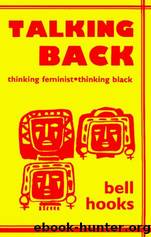Talking Back: Thinking Feminist, Thinking Black by Hooks Bell

Author:Hooks, Bell [hooks, bell]
Language: eng
Format: epub
Tags: EBC Converted, Politics, Sociology, feminism
ISBN: 9780896083523
Amazon: 0896083527
Goodreads: 728685
Publisher: South End Press
Published: 1989-01-01T08:00:00+00:00
13
Feminism and Militarism: A
Comment
As a child growing up in Hopkinsville, Kentucky with its proximity to Fort Campbell, I thought the army was composed primarily of black men. When I saw soldiers, they were black. I overheard adults talking about black men joining the army to find work, to find the dignity that comes with having a purpose in life. They would say, âbetter to be in the army than prowling the streets.â Yet my father cautioned his daughters about entering relationships with soldiers, telling us âhe knew what these men were likeâheâd been in the army.â There was an aspect of his experience serving in the all-black Quartermasters working supply lines during World War II that had changed him profoundly. After returning home, he showed no interest in travelling to new places, to âforeignâ lands. An unexplained, unnamed aspect of that experience made him linger near home. I can remember my surprise when I discovered pictures of him in uniform, pictures taken in foreign places about which he never spoke. Yet he always kept a picture of the black men in his section of the 537th Battalion in his room. As children, we often studied the faces of those black men in uniform, looking for him. At age sixty-one, he travelled to Indiana to reunite with his army comrades, to mourn for those dead, to lament that no amount of fighting had brought an end to war.
161
More than ten years ago, when I first applied to enter college, one school had a special scholarship for relatives of men who had fought in World War I. It was then that I asked my grandfather, Daddy Gus, if he
had fought in the war. His voice when he responded was gruff and exasperated, saying, âNo. I would have none of war. Why should I have fought in any war. No I never fought nobodyâs war.â Since childhood and into my adulthood, he had loomed large in the landscape of masculinity as a man who truly lived in peace and harmony with those around himâ violence was just not his way. His persistent anti-war stance, as well as the anti-war stance of other southern black males in our community who were very vocal about their feelings about militarism (highlighting the contradiction that black men should serve in wars, die for this country, for this democracy, which institutionalized racism and denied them freedom), impressed me. Their attitudes showed us that all men do not glory in war, that all men who fight in wars do not necessarily believe that wars are just, that men are not inherently capable of killing or that militarism is the only possible means of safety. I have thought of these black men often when I hear statements that suggest that men like war, that men wish for the glory of death in war.
Many women who advocate feminism see militarism as exemplifying patriarchal concepts of masculinity and the right of males to dominate others. To these women, struggling against militarism is to struggle against patriarchy.
Download
This site does not store any files on its server. We only index and link to content provided by other sites. Please contact the content providers to delete copyright contents if any and email us, we'll remove relevant links or contents immediately.
Cecilia; Or, Memoirs of an Heiress — Volume 1 by Fanny Burney(32558)
The Great Music City by Andrea Baker(32018)
Cecilia; Or, Memoirs of an Heiress — Volume 2 by Fanny Burney(31956)
Cecilia; Or, Memoirs of an Heiress — Volume 3 by Fanny Burney(31941)
We're Going to Need More Wine by Gabrielle Union(19046)
All the Missing Girls by Megan Miranda(16026)
Pimp by Iceberg Slim(14506)
For the Love of Europe by Rick Steves(14121)
Bombshells: Glamour Girls of a Lifetime by Sullivan Steve(14075)
Talking to Strangers by Malcolm Gladwell(13370)
Norse Mythology by Gaiman Neil(13363)
Fifty Shades Freed by E L James(13239)
Mindhunter: Inside the FBI's Elite Serial Crime Unit by John E. Douglas & Mark Olshaker(9342)
Crazy Rich Asians by Kevin Kwan(9292)
The Lost Art of Listening by Michael P. Nichols(7506)
Enlightenment Now: The Case for Reason, Science, Humanism, and Progress by Steven Pinker(7313)
The Four Agreements by Don Miguel Ruiz(6765)
Bad Blood by John Carreyrou(6621)
Weapons of Math Destruction by Cathy O'Neil(6279)
